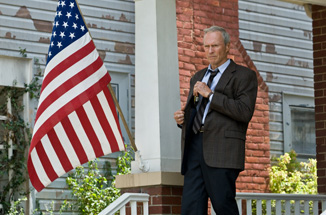He Said, She Said: Gran Torino
By Caroline Thibodeaux
January 28, 2009
She Said...
Gran Torino marks the fourth directorial effort from Clint Eastwood to be released in theatres since 2006. But this is the first film he's starred in since the Oscar-winning Million Dollar Baby, and he's chosen himself a doozy of a role. (A role which according to Eastwood, may be his last.) Eastwood plays Walt Kowalski – a bigoted, grizzled Korean War vet whose salad days are far behind him. Despite having children who also have children, Kowalski finds himself widowed, bitter and alone at the top of the film. He's a relic, living and drinking out the rest of his life in the home he shared with his wife for decades. But the old Detroit neighborhood has changed greatly – as evidenced by the many Hmong families who have migrated there. Walt's life becomes inextricably linked to his neighbors when Thao, the kid next door, tries to steal Walt's prized 1972 Gran Torino as part of a gang initiation rite. As Thao pays out his penance, Walt takes it upon himself to try to help Thao "man up". This tenuous relationship – as well as the bond that is formed with Thao's sister Sue – brings about an explosive denouement as well as a not wholly unexpected avenue for Walt's expiation.
If the role of Walt Kowalski were being played by anyone but Eastwood, it would still be quite an interesting character. But you simply cannot watch Eastwood's performance in this film and not be reminded of Dirty Harry and The Man with No Name. Kowalski is the embodiment of these iconic characters 20 - 25 years past their prime. Yes – he kicked a lot of ass which may or may not have needed kicking at the time he kicked it. And he's a man who does know how to "finish" things. But his is a jaundiced world view made even more myopic the more he squints. He helped to build and perpetuate a version of America that must somehow make atonement and find a reconciliation. His redemption may be the most obvious plot device coming down the track. But watching Kowalkski get there is half the fun.
And Gran Torino is surprisingly a lot of fun. Imagine if Harry Callahan retired and became the Consummate Grumpy Old Man. And then someone tried to steal from him. In addition to the wickedly humorous screenplay (by Nick Schenk and Dave Johansson), which time after time forces the audience to gasp in faux-politically correct embarrassment despite themselves, Eastwood is a gas, displaying a subtle comedic style in total opposition of anything he did during his bare knuckle brawling/orangutan movies from the '80s. As he hurls profanities at his thoughtless family and his concerned priest, guzzles beer on his porch and calls his neighbors every type of "gook" under the sun, Eastwood resembles an angry midway barker starring in his own personal Carnival of the Grotesque. At first, you sort of hate yourself for laughing at/with him as he stomps through the world spewing forth a variety of racist invective – but only at first. You may not see eye-to-eye with Walt, but you do want to see where he's going. By the third time he growls "Get off my lawn!" I almost expected the audience to take a drink.
It's a true testament to the strength of Eastwood's performance in this film, as he has to carry just about every scene on his own. Excluding the scenes with the perfectly cast Christopher Carley as the doughy, young, Irish-American priest (and veteran actor John Carroll Lynch as Walt's barber) – Eastwood has little support from his neophyte Hmong costars Bee Vang (Thao) and Ahney Her (Sue). Their resumes and work in this film suggest that this may be their first time in front of a camera. I can't imagine it was a simple task to cast these roles. That said, Eastwood's sure hand as a director and mentor eventually gets something resembling a performance out of these two. I would, however, have liked to have seen what could have happened with these characters if two actors with more experience had been utilized.
The film is shot simply enough, in keeping with who these characters are and the world in which they inhabit. There's nothing unnecessarily flashy or pretty going on here visually and there shouldn't be. (Walt probably wouldn't like that.) The cool grays and steel blues of a seen-better-days Detroit are reflected in the lighting and the starkness of the neighborhood. The exception (aside from the very last scene) is the lush green of Walt's garden, which conflicts greatly with the bleak, barren surrounding landscape. Is it any wonder that Thao finds solace and a quiet kinship there? "Gran Torino" works so well because it never rises to pretension or tries to turn Kowalski into some kind of old softie who Learns a Great Lesson. All this movie does is afford Eastwood one last great role and his audience a chance to not just enjoy him this time around, but to further reflect upon that greatness.




